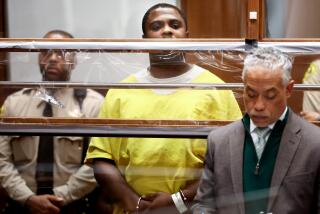Powell Defends Prewar Iraq View
- Share via
WASHINGTON — Nearly a year after his pivotal speech to the United Nations, Secretary of State Colin L. Powell on Thursday staunchly defended his arguments that Saddam Hussein had weapons of mass destruction that justified a war against Iraq.
Fielding questions on a variety of topics at a State Department news conference, Powell insisted that although postwar investigations had yet to find stockpiles of unconventional weapons, the ousted Iraqi regime for years possessed both the arms and the intention to use them.
“I am confident of what I presented last year; the intelligence community is confident of the material they gave me,” he said. “And this game is still unfolding.”
Powell, recently recovered from surgery for prostate cancer, defended his Feb. 5, 2003, U.N. speech, which laid out the administration’s case for invading Iraq. As he did so, a Washington think tank issued a report concluding that although Iraq posed a threat, the Bush administration had exaggerated it.
The report, by Joseph Cirincione, Jessica T. Mathews and George Perkovich of the Carnegie Endowment for International Peace, said the administration “systematically misrepresented the threat from Iraq’s WMD [weapons of mass destruction] and ballistic missile programs.”
Officials exaggerated the threat by minimizing uncertainties and caveats, and insisting, without evidence, that Hussein “would give whatever WMD he possessed to terrorists,” the report said.
Powell noted that the report did acknowledge that Iraq had possessed the capability to produce weapons of mass destruction. He said that although “I have not seen smoking-gun, concrete evidence” about connections between Hussein and the Al Qaeda terrorist network, “I think the possibility of such connections did exist. And it was prudent to consider them at the time that we did.”
He acknowledged that some weapons specialists have abandoned the continuing search for weapons of mass destruction in Iraq, a development that some outside analysts have taken as a signal that the administration is losing interest in the hunt. But, Powell said, “I presume that their particular job is finished.”
Powell’s news conference came three weeks after his surgery. He appeared relaxed and in good humor during the 45-minute event.
Powell sought to rebut charges that the Bush administration prefers to avoid multilateral diplomacy, and he argued that there have been a number of positive developments in world affairs in countries such as Afghanistan, Libya, Sudan and Iran. He noted the resumption of talks between Pakistan and India, rival nuclear powers.
Asked about Palestinian charges that Israel is trying to segregate Palestinians in the West Bank while denying them a separate state, Powell said, “I don’t believe we could accept a situation that results in anything that one might characterize as apartheid.”
He said that progress in Israel requires action by Palestinian Authority Prime Minister Ahmed Korei. If he can get control of the security forces and use them to put down terrorism, then “I’m confident we can move forward with the ‘road map’ ” peace initiative, Powell said.
Despite European complaints about American foot-dragging in the Israel-Palestinian dispute, Powell said the United Nations, the European Union and Russia were still behind the U.S.-backed peace plan. “They remain committed,” he said.
Powell also saw reason for hope that North Korea might sit down for six-party talks on its nuclear weapons program, even though it has refused to set a date.
U.S. officials in Asia are “getting encouraging signals from the South Koreans and the Chinese and the Japanese that we might be closer to the next round of talks,” he said. And he said that conversations are going on behind the scenes.
“Just because we’re not sitting in a guest house somewhere talking at the moment, that doesn’t mean discussions and negotiations and trading is not going on,” Powell said.
He also said that he had talked Wednesday to Brazil’s foreign minister about that country’s concern about new security rules requiring digital photos and fingerprints for visitors to the U.S. He said he told his counterpart, “Let’s work our way through this,” and he insisted that the rules were justified and necessary.
“It’s something we have to do. Why? To protect ourselves; to know who’s coming into our country,” he said. “That’s not unreasonable.”
More to Read
Sign up for Essential California
The most important California stories and recommendations in your inbox every morning.
You may occasionally receive promotional content from the Los Angeles Times.











